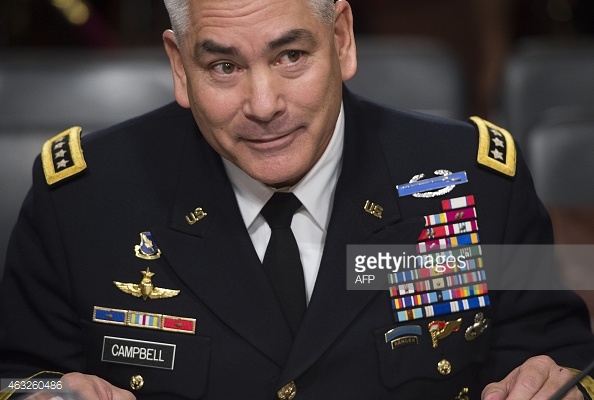Why Does The U.S Keep Altering Its Account Of The Strike On The Hospital?
US General Campbell

NEW DELHI: The United States has yet again altered its story on the strike on the Doctors Without Borders hospital in Kunduz, which killed at least 22 people. In the latest developments, US commander General John Campbell conceded that the strike was called by US special operations forces and not their Afghan allies, as previously alleged.
On Saturday, Campbell had given a different version of events. The General said that Afghan forces had requested US air cover after being engaged in a “tenacious fight” to retake the northern city of Kunduz from the Taliban.
On Monday at a press conference, Campbell did a volte face and said that Afghan forces had not directly communicated with the US pilots of an AC-130 gunship overhead.
Then on Tuesday, Campbell told the Senate armed services committee that “Even though the Afghans request that support, it still has to go through a rigorous US procedure to enable fires to go on the ground. We had a special operations unit that was in close vicinity that was talking to the aircraft that delivered those fires.”
The strike, which occurred a few days ago, killed at least 12 Médecins Sans Frontières (Doctors Without Borders) staff and ten patients -- who were seeking medical treatment as the Taliban captured the city of Kunduz earlier in the week.
MSF has denounced Campbell’s press conference as an attempt to shift blame to the Afghans. “The US military remains responsible for the targets it hits, even though it is part of a coalition,” said MSF Director General Christopher Stokes.
"On behalf of the American people, I extend my deepest condolences to the medical professionals and other civilians killed and injured in the tragic incident at a Doctors Without Borders hospital in Kunduz," Obama said in a statement released by the White House.
"The Department of Defense has launched a full investigation, and we will await the results of that inquiry before making a definitive judgment as to the circumstances of this tragedy. We will continue to work closely with President [Ashraf] Ghani, the Afghan government and our international partners to support the Afghan National Defense and Security forces as they work to secure their country," the statement said.
The UN called the strikes "inexcusable and possibly even criminal" with Secretary General Ban Ki Moon promising a thorough investigation. "International and Afghan military planners have an obligation to respect and protect civilians at all times, and medical facilities and personnel are the object of a special protection," said UN High Commissioner Ra'ad Al Hussein Zeid.
MSF responded to the incident by condemning the suspected US bombing as “horrific.” MSF president Meinie Nicolai described the incident as "abhorrent and a grave violation of international humanitarian law.”
"All indications currently point to the bombing being carried out by international Coalition forces," MSF said. The charity further added that US and Afghan forces had been provided exact coordinates of the hospital facility -- which was bombed overnight in strikes that lasted over an hour.
“MSF wishes to clarify that all parties to the conflict, including in Kabul and Washington, were clearly informed of the precise location (GPS Coordinates) of the MSF facilities in Kunduz, including the hospital,” MSF stated.
Further, the organisation added that the strikes appeared to continue even after MSF contacted US forces. “The bombing in Kunduz continued for more than 30 minutes after American and Afghan military officials in Kabul and Washington were first informed by MSF that its hospital was struck,” MSF said.
The incident comes as MSF services are needed more than ever, with Afghanistan seeing its heaviest fighting in recent years in the city of Kunduz. Government forces claim that they have retaken strategic points in the city, although local reports indicate that the Taliban is still firmly holding sway in many parts.



